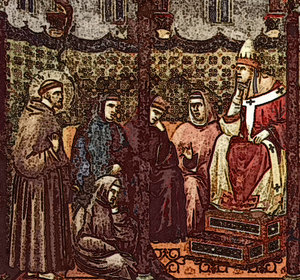 Last Sunday at the keynote address given by Father Julián Carrón who said among many other good things is that preaching is taking part in man’s search for God. Moreover, preaching arouses curiosity from within, that one of its aim is to overcome the divide between faith and life.
Last Sunday at the keynote address given by Father Julián Carrón who said among many other good things is that preaching is taking part in man’s search for God. Moreover, preaching arouses curiosity from within, that one of its aim is to overcome the divide between faith and life.
Tag: Gianfranco Ravasi
1,400 year old fresco of St Paul found
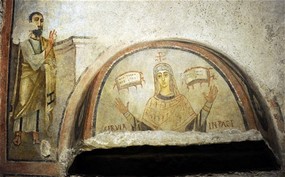 The religious and art worlds are abuzz with the latest find: an early 6th century image of the Apostle Paul in Naples. The discovery happened in the Catacombs of San Gennaro.
The religious and art worlds are abuzz with the latest find: an early 6th century image of the Apostle Paul in Naples. The discovery happened in the Catacombs of San Gennaro.
Adult Stem Cells: Science and the Future of Man and Culture: a deeper dialogue between science and faith
Court of the Gentiles –next step
Success is not a word that is appropriate for matters pertaining to faith, even if it’s dealing those hearing the message of the Gospel for the first time or fancy programs. But I think it’s fair to say that from the reports that are coming from the Court of the Gentiles last weekend, this event was extraordinarily successful. Cardinal Gianfranco Ravasi, his staff and collaborators have the makings of very significant work for culture, humanity and theology which will, no doubt, bear much fruit.
Court of the Gentiles –Le Parvis des Gentils à Paris: a call to fraternity to believers and nonbelievers to live coherent in Christ, and for a new humanity
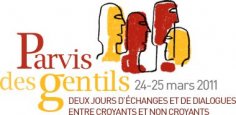 Cardinal Gianfranco Ravasi’s interview on the importance of the Court of the Gentiles for us. This is probably the single most significant initiative of the Pontifical Council for Culture taking seriously the place of belief and unbelief. The Pope some time ago asked the pastors of the Church to take atheism as a serious matter to engage in. And by atheism he’s not suggesting the Christopher Hitchens’ version of atheism but what might be called “honest atheism,” those who ask sincere questions of belief and who are seeking to live a coherent life. The Pope is brilliant in his call to respect, dialogue and living.
Cardinal Gianfranco Ravasi’s interview on the importance of the Court of the Gentiles for us. This is probably the single most significant initiative of the Pontifical Council for Culture taking seriously the place of belief and unbelief. The Pope some time ago asked the pastors of the Church to take atheism as a serious matter to engage in. And by atheism he’s not suggesting the Christopher Hitchens’ version of atheism but what might be called “honest atheism,” those who ask sincere questions of belief and who are seeking to live a coherent life. The Pope is brilliant in his call to respect, dialogue and living.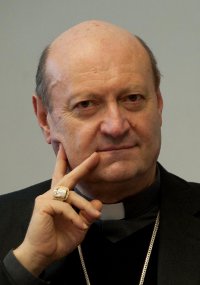 I know that at the invitation of Cardinal André Vingt-Trois, the Archbishop of Paris, and of Cardinal Gianfranco Ravasi (seen right), the President of the Pontifical Council for Culture, you are gathered in great numbers in front of the Cathedral of Notre Dame in Paris. I greet all of you, together with our brothers and friends from the Taizé Community. I am grateful to the Pontifical Council for having taken up and extended my invitation to open a number of “Courts of the Gentiles” within the Church. This image refers to the vast open space near the Temple of Jerusalem where all those who did not share the faith of Israel could approach the Temple and ask questions about religion. There they could meet the scribes, speak of faith and even pray to the unknown God. The Court was then an area of separation, since Gentiles did not have the right to enter the consecrated area, yet Jesus Christ came to “break down the dividing wall” between Jews and Gentiles, and to “reconcile both to God in one body through the cross, thus putting to death that hostility in himself”. In the words of Saint Paul, “He came and proclaimed peace…” (cf. Eph 2:14-17).
I know that at the invitation of Cardinal André Vingt-Trois, the Archbishop of Paris, and of Cardinal Gianfranco Ravasi (seen right), the President of the Pontifical Council for Culture, you are gathered in great numbers in front of the Cathedral of Notre Dame in Paris. I greet all of you, together with our brothers and friends from the Taizé Community. I am grateful to the Pontifical Council for having taken up and extended my invitation to open a number of “Courts of the Gentiles” within the Church. This image refers to the vast open space near the Temple of Jerusalem where all those who did not share the faith of Israel could approach the Temple and ask questions about religion. There they could meet the scribes, speak of faith and even pray to the unknown God. The Court was then an area of separation, since Gentiles did not have the right to enter the consecrated area, yet Jesus Christ came to “break down the dividing wall” between Jews and Gentiles, and to “reconcile both to God in one body through the cross, thus putting to death that hostility in himself”. In the words of Saint Paul, “He came and proclaimed peace…” (cf. Eph 2:14-17).
Gianfranco Ravasi on the move to Milan, next Pope?
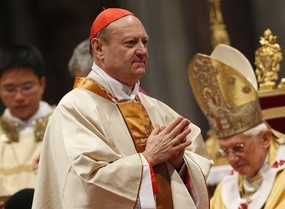 A week ago today, Archbishop Gianfranco Ravasi, 68, was created a cardinal by Pope Benedict XVI. Ravasi, since 2007, is the well-equipped, critically acclaimed, lover of art and music, and a man who has a great sense of humor President of the Pontifical Council for Culture, the “Minister of Culture” (some might say he’s a “culture vulture”) and he heads the Pontifical Commission for the Cultural Heritage of the Church, and the Pontifical Commission for Sacred Archeology. He’s the former head of the Ambrosian Library in Milan. He turned the Library into a cultural and intellectual destination.
A week ago today, Archbishop Gianfranco Ravasi, 68, was created a cardinal by Pope Benedict XVI. Ravasi, since 2007, is the well-equipped, critically acclaimed, lover of art and music, and a man who has a great sense of humor President of the Pontifical Council for Culture, the “Minister of Culture” (some might say he’s a “culture vulture”) and he heads the Pontifical Commission for the Cultural Heritage of the Church, and the Pontifical Commission for Sacred Archeology. He’s the former head of the Ambrosian Library in Milan. He turned the Library into a cultural and intellectual destination.
Continue reading Gianfranco Ravasi on the move to Milan, next Pope?
Pope calls for meeting with contemporary artists
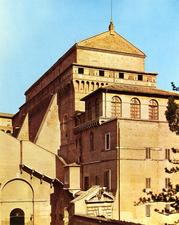 Under the leadership of Archbishop Gianfranco Ravasi, President of the Pontifical Council for Culture, contemporary artists of all media are invited to the Vatican for a meeting on November 21st.
Under the leadership of Archbishop Gianfranco Ravasi, President of the Pontifical Council for Culture, contemporary artists of all media are invited to the Vatican for a meeting on November 21st.
